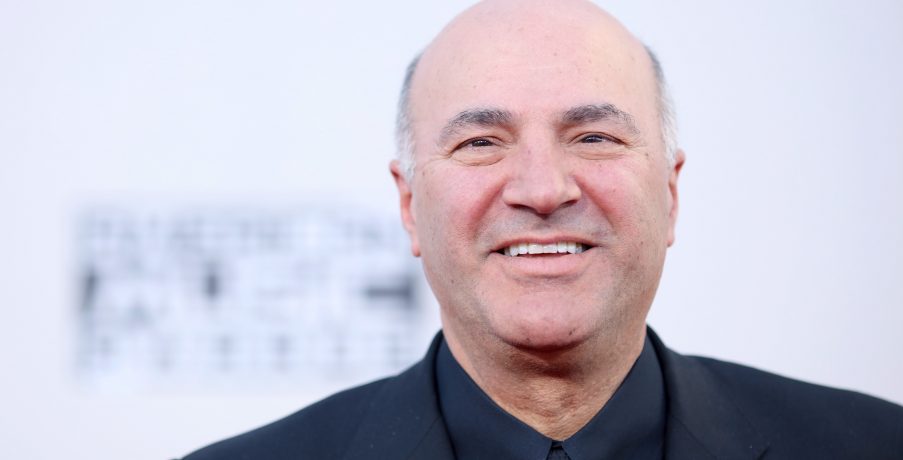
Neil A. Carousso produces NewsNation original “Kurt’s Country” – a celebration of country music and a slice of Americana with host Kurt Bardella.
-
‘Shark Tank’ Star Daymond John Reveals Creative Business Solutions To Survive Coronavirus Pandemic
Posted by: Neil A. CaroussoIn Best Of, Entertainment, Featured, Guest, Interview, Latest, News Stories, Technology, The World, Top News, videosPost Views: 932By Neil A. Carousso
NEW YORK (WCBS 880) – Entrepreneur Daymond John, an investor on ABC’s “Shark Tank,” is encouraging his businesses to think outside the box to survive the economic crisis caused by the COVID-19 outbreak.
“Once you know what you have with your staff and what you have with your inventory, find out who else out there you can collaborate with,” John told Joe Connolly and Neil A. Carousso on the WCBS Small Business Spotlight focusing on small business survival, sponsored by BNB Bank.
The FUBU founder and bestselling author of “Power Shift: Transform Any Situation, Close Any Deal and Achieve any Outcome” pointed to Cowboy Fitness, based in Utah and Colorado, which he invested in on season 4 of “Shark Tank,” as an example of how business owners should pivot.
“They basically loaned (their members) the equipment, and then, now, he does video conferences, kind of like a Peloton,” John said, adding that Cowboy Fitness retained most of its members by creating a new service.
They have also secured partnerships with local stores that are shuttered and suffering from the lack of foot traffic. The retailers sell athletic apparel to its gym members at a 30 percent discount. In turn, Cowboy Fitness earns 5 percent on each sale. John calls this a “win-win” solution.
The 51-year-old businessman says technological advancements have been implemented much faster because of the coronavirus pandemic, forcing companies to develop new efficiencies and work-from-home policies. The fashion brand expert says traditional retail will not be able to bounce back without making vast changes to its business model.
“If I had Macy’s, one of the most famous and iconic retailers in the world, I would have cameras in there that are showing people’s style or various other things that people can feel like they can go in there because they’re an influencer,” John said, emphasizing, “They have to really make sure they become more of an events space than anything else.”
At The Shark Group, which he founded in 2009, John advises businesses on product awareness and developing genuine, innovative approaches to grow brands. One of the companies he works with is Bombas, a sock company founded by Dave Heath, whose core mission is to donate one pair of socks to the homeless community for every pair bought.
.@TheSharkDaymond tells @JoeConnollybiz and me he looks to invest in companies on @ABCSharkTank that “add value” to the communities they serve like @BOMBAS. #SharkTank #branding
More with Daymond on the @WCBS880 Small Business Spotlight Podcast: https://t.co/oYPQxdqcka pic.twitter.com/w2mCxr2vUj
— Neil A. Carousso (@NeilACarousso) May 13, 2020
“The millennials today, and people today, they want to say I didn’t give one time at the end of the year, I gave 400 times,” John explained. “How do you find ways to add more value to the person and barter in your deals?”
That’s what he is looking for on “Shark Tank:” Companies that are not only making money, but also demonstrate authenticity and passion for the communities they serve.
“I’m trying to find out if I like the entrepreneur personally, if I feel that I could communicate with them, I could add value to them, they’re a problem solver not a problem creator and whether this business works out or not, we’ll do another business together,” he said.
John took Connolly and Carousso behind the scenes of the reality TV show, telling WCBS 880 that the Sharks are competitive and the negotiating among the millionaires and billionaires is “real.”
“You don’t want to get embarrassed on national television by Mark Cuban or Barbara (Corcoran) beating you out in front of everybody,” John said.
He revealed “Shark Tank” pitches can last up to two hours, but viewers only see 8 minutes. Finalizing deals can last months after the taping as the Sharks vet businesses carefully before writing a check out of their own bank accounts.
When asked if he believes entrepreneurs are born or made, the Queens native said it’s “instinct,” elaborating that people are often discouraged from starting their own businesses because of difficulty or the dismissive attitude that it’s “never been done before.” But, John had already started a few businesses before he was 18 when he launched FUBU, now worth about $400 million, out of his home in Hollis.
While driving around Queens, his mother, Margot, encouraged him to follow his dreams. She said, as John recalled, “Every single thing around here started with one person that had one idea that took one action. Why can that not be you?”
“I started by selling hats on the corner in 1989 and I had sold $800 worth of hats in one hour,” he said of his first designed ski caps that he made by hand. “I just had to sow a straight line to really figure out how to make these hats.”
He closed that business three times between 1989 and 1992 because he ran out of money. But, his shirts became popular, in part, because he loaned them to local artists on the rise who wore FUBU T-shirts in music videos.
John’s mother took him to trade shows around the country where he earned hundreds of thousands of dollars in sales. But, he needed inventory. As an inexperienced young businessman, he was unable to secure a loan from a bank, so Margot took out a $100,000 loan on her house that John said was only worth $75,000.
“I sell all the furniture in my house, move in industrial sowing machines, sleep in sleeping bags next to the sowing machines,” he said of his hustle.
He also worked at Red Lobster at night to make money to invest into his dream clothing business that he operated during the day.
John said he bought an advertisement in The New York Times or New York Daily News seeking investors to provide the funding he needed to fill orders and move FUBU out of his home in Hollis.
“Thirty-three people called. 30 of them were loan sharks or Kevin O’Leary-type of people,” his fellow “Shark Tank” star quipped. “One of them was Samsung’s textile division.”
They signed a deal for Samsung to take over manufacturing, reducing costs, and John learned a lesson in business he would later impart on others while living the American Dream.
-
‘Shark Tank’ Investor Kevin O’Leary Shares His Keys To Small Business Survival
Posted by: Neil A. CaroussoIn Best Of, Featured, Guest, Interview, Latest, News Stories, Technology, The World, Top News, videosPost Views: 1,175By Neil A. Carousso
NEW YORK (WCBS 880) – Entrepreneur Kevin O’Leary stresses communication and a pivot to digital sales during the “unprecedented” coronavirus pandemic.
“Learn to communicate,” O’Leary advised in a wide-ranging interview with Joe Connolly on the WCBS Small Business Spotlight, sponsored by BNB Bank.
“Your employees and your customers: They want to hear from you every day,” he said.
O’Leary is known as “Mr. Wonderful” on ABC’s hit Friday night reality TV program “Shark Tank.” He is also a contributor to CNBC that re-runs episodes of “Shark Tank” when the market is closed. In 1986, he founded Softkey, an educational software company based in Toronto, that he sold to Mattel for $4.2 billion in 1999. He owns O’Leary Financial Group, which is a conglomerate of brands that includes investment firm O’Leary Funds. He also owns O’Leary Fine Wines. His net worth is estimated at $400 million.
“When you’re honest with your customers, they become incredibly loyal,” O’Leary said, adding, “The minute they smell B.S., you’ve lost them forever. Don’t lie to people.”
He shares his philosophy on business with Connolly, including that owners should become profitable by their third year in operations, or “take it behind the barn and shoot it.” During the global health crisis, O’Leary says owners must adjust to the changing market while playing to one’s strengths.
“They genuinely care about companies and products and services that they’ve grown to trust and they want to support them during this period of difficulty to make sure that these businesses survive,” he said.
One way to stay afloat, O’Leary underscored, is to learn digital marketing and focus one’s energy on targeting local customers.
“It means you may have to get a Shopify license, you may have to learn how to use DocuSign, you may have to understand the geo-locking tools of Facebook,” Mr. Wonderful said on the WCBS Small Business Spotlight Podcast.
“Geo-locking” is a tool within paid Facebook campaigns that allows users to target a preferred audience to optimize a paid post’s impact by demographics.
“I only want to spend my advertising dollars, reaching out to people in this specific area,” O’Leary explained, adding, “That’s what we’re finding is really working, being very concentrated in what you’re trying to do, because in times like these, you really want to play to your strengths.”
O’Leary told WCBS 880 he’s looking to cut real estate costs as his employees work from home. He said if employees are being productive and companies are using digital conferencing services and maximizing on digital marketing strategy, businesses can “save a ton of money.”
“Now the only thing is, it’s not good news for rates, it’s not good news for landlords, it’s not good news for retail space, it’s not good news for real estate, generally, because we don’t need it. Yeah, we need our houses and our apartments, but nothing else,” said Mr. Wonderful.
Hear more from entrepreneur Kevin O’Leary, including what opportunities he spotted in his “Shark Tank” investments, on the WCBS Small Business Spotlight Podcast above and on the RADIO.COM app.
-
Four Freedom Park Conservatory Uses Anonymous Tip App To Enforce Social Distancing On Roosevelt Island
Posted by: Neil A. CaroussoPost Views: 894By Neil A. Carousso
NEW YORK (WCBS 880) – Four Freedom Park Conservatory on Roosevelt Island is employing patented technology to keep people six feet apart at all times to slow the spread of COVID-19.
“They’re very proactive in wanting to encourage people to communicate these type of things,” said Anthony Lavalle, founder of report it® – a patented application that partners with schools, businesses and law enforcement agencies to expedite anonymous tips for non-emergencies.
Four Freedom Park Conservatory, Inc. operates and maintains the Franklin D. Roosevelt Four Freedom State Park. It also produces events at the park located at the southern tip of Roosevelt Island, overlooking the United Nations on Manhattan’s East Side. It has been a client of report it® for a few years and approached them about developing a solution to enforce social distancing.
“We geofence an area,” Lavalle explained.
A geofence is a virtual geographic boundary that enables software to trigger a reaction when a smartphone enters or exits a defined area. Report it® sets up geofencing for its partners throughout the country to enable users to submit an anonymous tip to companies and police to act upon in a timely manner.
The Long Island based tech company was founded in 1999 at the outset of the Internet, harnessing the capability to collect and facilitate data such as photos, videos and a description of the complaint.
The park manager will receive a report immediately with key actionable information.
“We actually capture the geographic location of where that photo was taken, so that the receiver of the report knows exactly where this is occurring and where the correction needs to be made,” he said.
Those photos are also time-stamped for verification, which Lavalle said separates report it® from other applications such as the NYC 311 app because police may respond to an incident that occurred much earlier.
The report it® app is also available in all languages.
“I think that comfort level of people being able to utilize something in their native language to escalate a concern really helps them to communicate as well,” Lavalle emphasized.
He has seen an increase in reports through the app during the coronavirus pandemic.
-
Chinese Operatives Spreading Disinformation About Coronavirus To Sow Political Discord In US: Report
Posted by: Neil A. CaroussoPost Views: 992By Neil A. Carousso
WASHINGTON (WCBS 880) — China is looking to amplify disinformation about the coronavirus pandemic to exploit political divisions in the United States, according to a report in The New York Times.
The Times interviewed intelligence officials who work in six different U.S. agencies. The officials believe China is using tactics that resemble Russia’s efforts to sow discord during our elections by utilizing social media trolls to push agendas to sympathetic Americans who unknowingly propagate its messages.
“We’re seeing, now, tactics that are not surprising to many of us who served in government,” said Nadia Schadlow, Ph.D., former U.S. Deputy National Security Advisor for Strategy, in an interview with WCBS 880 producer Neil A. Carousso.
China is reportedly not only using social media to disseminate false information, but also sending text messages and messages via WhatsApp, which are more difficult for law enforcement to detect because it is encrypted.
One particularly unsettling message to U.S. officials that became widespread was one claiming President Donald J. Trump was set to issue a nationwide lockdown. The White House National Security Council tweeted “FAKE” in response.
Text message rumors of a national #quarantine are FAKE. There is no national lockdown. @CDCgov has and will continue to post the latest guidance on #COVID19. #coronavirus
— NSC 45 Archived (@WHNSC45) March 16, 2020
“It’s disturbing and upsetting that Americans would be taken advantage of during such a difficult time in our country’s history,” Dr. Schadlow said.
She is currently a senior fellow at the Hudson Institute, an independent policy organization in Washington, D.C. that promotes global security through research and analysis. In 2018, Dr. Schadlow advised the Trump Administration on national security strategy as an assistant to the president on The White House National Security Council.
“China’s much more of a strategic competitor to the United States,” Dr. Schadlow explained.
She noted both Democrats and Republicans have expressed concern over the Communist Party’s economic activities, including intellectual property theft.
“Essentially it wasn’t a level playing field doing business with China,” said Dr. Schadlow.
She added that when President Trump came into office in 2017, U.S. policy towards China shifted to “push back” against its malignant activities.
The World Trade Organization indicates China is the number one exporter in the world. It is also the largest supplier of goods to the United States. China accounts for 21.2 percent of overall U.S. imports, according to The Office of the U.S. Trade Representative.
Dr. Schadlow said critical technology and medicine has been manufactured in China over the last 15 years. She believes that will change as Americans prefer to have essential supplies produced in their country or U.S. allied nations.
“I do think we are going to see a shift in those areas,” the former National Security Council advisor said, adding, “There is a recognition that it is a national security concern.”
-
Small Business Survival: Brooklyn Navy Yard Manufacturers Step Up During the COVID-19 Crisis
Posted by: Neil A. CaroussoIn Best Of, Featured, Guest, Interview, Latest, News Stories, Technology, The World, Top News, videosPost Views: 1,223By Neil A. Carousso
NEW YORK (WCBS 880) – Businesses at the Brooklyn Navy Yard industrial complex are revitalizing the country’s manufacturing amid the global pandemic.
David Ehrenberg is the President and CEO of the Brooklyn Navy Yard Development Corporation, which produces roughly $2.35 billion of annual economic output for New York City among more than 400 companies located there across various industries.
“These are not your old school manufacturers. These are very high-tech, very creative hardware companies,” Ehrenberg told WCBS 880’s Joe Connolly on this week’s WCBS Small Business Spotlight focusing on small business survival, sponsored by BNB Bank.
Brooklyn Navy Yard businesses employ more than 10,000 workers – many of whom have become essential workers as they produce vital medical equipment needed to treat the coronavirus.
“Our tenants have really been doing amazing, amazing things, producing everything from medical gowns to face shields, hand sanitizer and a series of other products,” said Ehrenberg, noting that this equipment is being shipped directly to hospitals.
Bednark Studio, Voodoo Manufacturing and Farmshelf – previous WCBS Small Business Spotlight subjects housed in the Brooklyn Navy Yard – are contributing to the broad COVID-19 fight. Bednark Studio is manufacturing face shields for frontline hospital workers in the City, 3-D-printing company Voodoo Manufacturing makes FDA-approved medical devices, and Farmshelf has been on the cutting edge of the changes in the U.S. food supply that has been accelerated by the coronavirus outbreak.
“A lot of people think that manufacturing is dead in New York and it’s not,” Ehrenberg said, adding that because of lower real estate prices in Brooklyn, growing technology companies that emphasize a high standard of craftsmanship and design can attract top talent the Big Apple has to offer.
The Brooklyn Navy Yard Development Corp. head told Connolly they started communicating with New York City officials and local hospitals about their needs before they contacted business owners to discover that they were ahead of the curve.
“We had companies who were ordering materials, who have relationships with factories in China, who were buying tens of thousands of gowns be shipped over here and donated,” he said.
Ehrenberg highlighted the “civic pride” of Brooklyn Navy Yard businesses, saying owners respond to his contacts by asking if there’s more they can do to contribute to the City’s response.
https://twitter.com/NeilACarousso/status/1252988378498379777
“The supply chains have just eased up, both, because of the level of demand, but also, you have certain countries (that) are keeping supplies for themselves right now,” he said.
His tenants have been able to manufacture fully American made products in their factories even before President Donald J. Trump invoked the Korean War era Defense Production Act to mandate U.S. companies to make medical equipment. The President and other government officials, namely New York Governor Andrew Cuomo, have revealed they are relying on countries like China, where the coronavirus originated, to import life-saving equipment such as ventilators and N95 masks.
Listen to the WCBS Small Business Spotlight Podcast above to hear how businesses in the Brooklyn Navy Yard are revolutionizing American manufacturing in the time of dire need.












